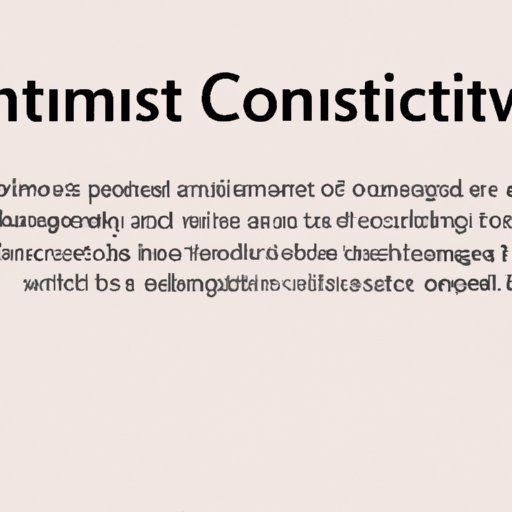Introduction
Counterclaims are essential components of any persuasive writing. A counterclaim is an argument that challenges and refutes another argument. When crafting a persuasive argument, writers must present both sides of the issue and use evidence to support each side. By providing a counterclaim, writers demonstrate their understanding of the issue and the ability to think critically. In this article, we will explore what is a counterclaim in writing, its purpose, benefits, common mistakes, and how to incorporate it into argumentative essays.

Crafting Persuasive Arguments with Counterclaims
When constructing a persuasive argument, it is important to include both claims and counterclaims. A claim is an assertion about a particular topic or issue. It is the main point that the writer is trying to make. A counterclaim is the opposite of a claim. It is an argument that refutes or challenges the original claim. By providing a counterclaim, the writer shows that they have considered multiple perspectives on the issue and can think critically about the topic.
Benefits of Including Counterclaims
Including counterclaims in your writing can be beneficial for several reasons. First, it helps you demonstrate your understanding of the issue. By presenting multiple perspectives on a topic, you show that you are familiar with the different arguments and can think critically about them. Second, it allows you to anticipate and address potential objections to your argument. By including a counterclaim, you can anticipate objections and provide evidence to refute them. Finally, it makes your argument more persuasive. By demonstrating that you have considered all sides of the issue, you can make a stronger case for your own argument.
Examples of Counterclaims in Writing
Counterclaims can be used in a variety of writing genres. For example, in a persuasive essay, a counterclaim might challenge the author’s position on an issue. In a research paper, a counterclaim might present an alternative explanation for the data. In a literary analysis, a counterclaim might argue against a particular interpretation of the text. Regardless of the genre, a counterclaim should be supported by evidence and well-reasoned arguments.

Examining the Role of Counterclaims in Academic Writing
Counterclaims are also important in academic writing. Academic writing requires writers to think critically and consider different perspectives on an issue. By providing a counterclaim, writers demonstrate their understanding of the issue and their ability to think critically. Additionally, counterclaims help writers anticipate and address potential objections to their argument.
Examples of Counterclaims in Academic Writing
Counterclaims can be used in a variety of academic genres. For example, in a research paper, a counterclaim might present an alternative explanation for the data. In an argumentative essay, a counterclaim might challenge the author’s position on an issue. In a literature review, a counterclaim might present an opposing perspective on the issue. Regardless of the genre, a counterclaim should be supported by evidence and well-reasoned arguments.
Why Counterclaims are Important in Academic Writing
Counterclaims are important in academic writing because they demonstrate an understanding of the issue and an ability to think critically. By providing a counterclaim, writers show that they have considered multiple perspectives on the issue and can evaluate them objectively. Additionally, counterclaims help writers anticipate and address potential objections to their argument. By including a counterclaim, writers can make their argument more persuasive and compelling.

Strategies for Constructing an Effective Counterclaim
When constructing a counterclaim, it is important to consider several strategies. First, it is important to provide evidence to support the counterclaim. Evidence can come from a variety of sources, such as personal experience, research, or other expert opinions. Second, it is important to clearly explain why the counterclaim refutes or challenges the original claim. Finally, it is important to avoid logical fallacies, such as ad hominem attacks, false dichotomies, or appeals to emotion.
Guidelines for Constructing a Counterclaim
- Provide evidence to support the counterclaim.
- Explain why the counterclaim refutes or challenges the original claim.
- Avoid logical fallacies.
Common Mistakes to Avoid when Writing a Counterclaim
- Failing to provide evidence to support the counterclaim.
- Not explaining why the counterclaim refutes or challenges the original claim.
- Using logical fallacies, such as ad hominem attacks, false dichotomies, or appeals to emotion.
Understanding Counterclaims in Argumentative Essays
Counterclaims are also important in argumentative essays. An argumentative essay is a type of essay that presents both sides of an issue and uses evidence to support each side. By incorporating a counterclaim into an argumentative essay, writers demonstrate their understanding of the issue and their ability to think critically about it.
How to Incorporate Counterclaims into Argumentative Essays
When incorporating a counterclaim into an argumentative essay, it is important to remember several key points. First, provide evidence to support the counterclaim. Evidence can come from a variety of sources, such as personal experience, research, or other expert opinions. Second, explain why the counterclaim refutes or challenges the original claim. Third, avoid logical fallacies, such as ad hominem attacks, false dichotomies, or appeals to emotion.
Examples of Counterclaims in Argumentative Essays
Counterclaims can be used in a variety of argumentative essays. For example, in an essay about the death penalty, a counterclaim might argue that the death penalty is not an effective deterrent to crime. In an essay about gun control, a counterclaim might argue that gun control laws do not reduce crime. In an essay about climate change, a counterclaim might argue that human activities are not the primary cause of global warming.
Conclusion
In conclusion, counterclaims are important components of any persuasive writing. They allow writers to demonstrate their understanding of the issue and their ability to think critically about it. Additionally, counterclaims help writers anticipate and address potential objections to their argument. When constructing a counterclaim, it is important to provide evidence to support it, explain why it refutes or challenges the original claim, and avoid logical fallacies. By following these guidelines, writers can craft persuasive arguments with counterclaims.
Summary of Key Points
- A counterclaim is an argument that challenges and refutes another argument.
- Including counterclaims in persuasive writing helps demonstrate understanding of the issue and the ability to think critically.
- Counterclaims should be supported by evidence and well-reasoned arguments.
- When constructing a counterclaim, provide evidence to support it, explain why it refutes or challenges the original claim, and avoid logical fallacies.
Final Thoughts on Counterclaims in Writing
Counterclaims are essential components of any persuasive writing. By incorporating counterclaims into their writing, writers demonstrate their understanding of the issue and their ability to think critically about it. Additionally, counterclaims help writers anticipate and address potential objections to their argument. By following the guidelines outlined in this article, writers can effectively craft persuasive arguments with counterclaims.
(Note: Is this article not meeting your expectations? Do you have knowledge or insights to share? Unlock new opportunities and expand your reach by joining our authors team. Click Registration to join us and share your expertise with our readers.)
